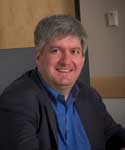Big Ideas, a CITRIS-supported campus initiative, is giving Berkeley
students the resources they need to change the world. Their next donor
could easily be you.
by Jenn Shreve
…………………………………………..
CITRIS
students are changing the world—from the refugee camps of Darfur and
the Amazonian tribes of Ecuador to the board rooms of Silicon Valley. A
new CITRIS-supported initiative at UC Berkeley is making sure they have
the resources they need to make a difference on the campus, at home,
and abroad.
Called Big Ideas, the new initiative is launching its second annual Bears Breaking Boundaries competition,
which awards student groups with the best world-changing proposals.
Last year, 29 student-led projects received a total of $100,000 in
initial seed funding. An online marketplace allows students to raise
additional funds from outside donors.
"The goal of Big
Ideas is to help Cal students change the world,” says Tom Kalil,
Special Assistant to the Chancellor for Science and Technology and
founder of Big Ideas. “Students are not only identifying projects they
would like to work on during the summer, but also designing new
courses, certificate programs, and research centers.”
 Tom Kalil, founder of Big Ideas.
Tom Kalil, founder of Big Ideas.
Kalil
started Big Ideas in 2005 with an unrestricted grant from eBay founder
Pierre Omidyar's Omidyar Network. CITRIS was an early supporter of Big
Ideas, backing a competition on "IT for society" that was open to all
four CITRIS campuses (Berkeley, Davis, Santa Cruz, and Merced).
As
Kalil pondered what to do with the grant, he found inspiration in the
Berkeley Nanotechnology Club. The 300-member student-led group was
organizing an annual conference with 500 attendees and very high-level
speakers. The students encouraged the formation of a new high-tech
venture that won an Intel-sponsored global business plan competition,
and brought together universities and national labs for a Bay Area-wide
poster competition.
"I wanted to see whether I could
replicate their success by supporting student-led activities in a broad
range of areas, such as energy, IT, biotech, health, public policy, and
global poverty reduction," Kalil says.
 Last year's Big Ideas competition winners.
Last year's Big Ideas competition winners.
He
sought out student projects that "take advantage of the breadth and
excellence we have on the campus, that harness our intellectual capital
to address some big problem—whether it is on the local, national, or
even global level— and that also have the potential to be catalysts for
larger research, education, and service activity on campus."
Kalil
soon found himself with more good projects than he could fund. That is
when he got the idea to set up a Big Ideas Marketplace, a virtual
trading floor where students could present their work and solicit
donations from alumni, foundations, companies, and other donors. It
would serve as a place to recruit, network, get feedback, and create a
thriving ecosystem to nurture even more big ideas.
"It is
a tremendous resource for us to get connected with potential funders
who are interested in these issues," says undergraduate public health
major Karis Miyake, who works with the Safe Water for Shuar project.
Led
by students in the Cal Undergraduate Public Health Coalition (Cal
UPHC), the Shuar project is developing solutions for sustainable water
sanitation and better nutrition among tribes in the Pastaza Province of
Ecuador. With help from Big Ideas, students have met with the
communities and assessed their needs. They have also planned trips to
implement their ideas this year.
Shanthi Nataraj, a third
year graduate student in Agricultural and Resource Economics, is
working on redesigning smokeless stoves from China for the Indian
market. She has used Big Ideas to network and research.
"It
is a great repository of amazing information. We found out that there
is another smokeless stoves project going on in Darfur. So it helps us
to network with each other and find out if we can help each other out,"
says Nataraj.
Both Nataraj and Miyake say they appreciate
the opportunity to apply their academic learning to real world
problems. Ultimately, Kalil hopes academic learning itself to be
impacted, as big ideas are transformed into new courses, centers, and
campus initiatives.
"Berkeley attracts many students who are
interested in the human condition and linking their research and
education to real-world problems. We should be encouraging this,” Kalil
says.
For more information:
UC Berkeley College of Engineering